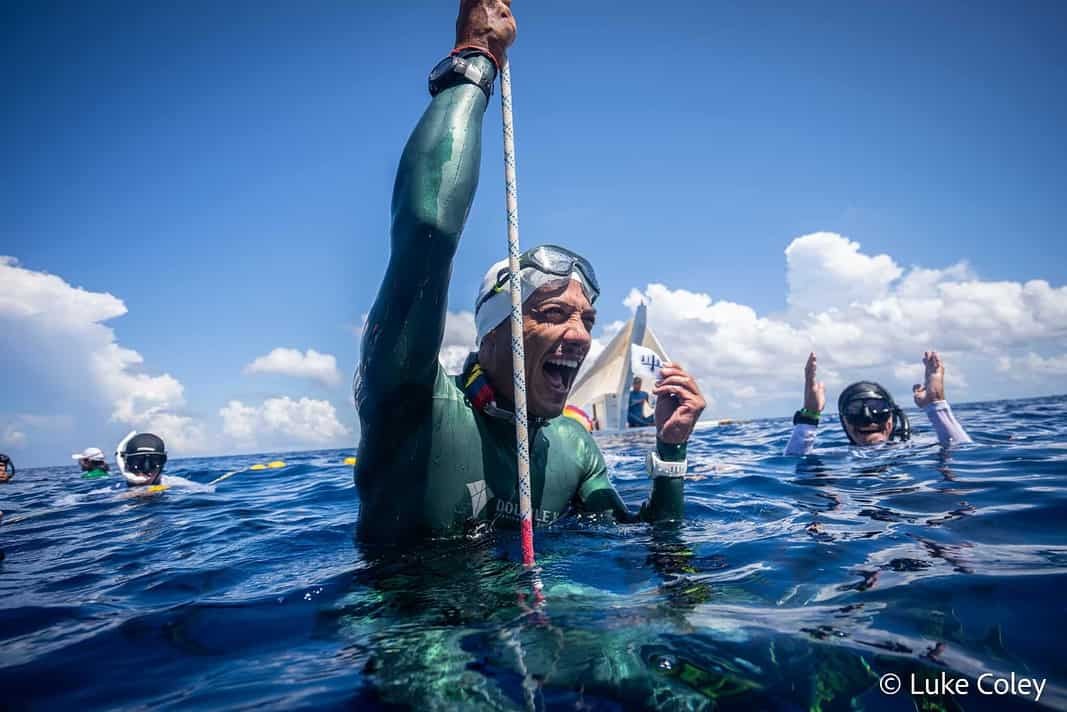Unless you pushed him to talk, you might not know how inspiring Alex Llinas is. That’s an objective evaluation, of course. But It was only upon reading his resume and pushing for his life story that we had the opportunity to learn what kind of athlete he is.
Alex Llinas has an enviable CV. And we aren’t just talking about freediving. His astonishingly long athletic resume includes being an underwater stuntman for some major directors, commercials, podiums in many different sports, regional championships, adventure racing, cycling, wind and boardsports, and more.
And Alex sets a tremendous example of resilience in the face of adversity. Around three years ago, he was diagnosed with Non-Hodgkins Follicular lymphoma. Two months before the start of treatment, he set his first national record at the end of Vertical Blue, while he was there to act as a safety diver, not primarily as an athlete. Five months after completing chemotherapy in 2019, he set two national no-fins records. And for Alex, like many for so many of us, the Pandemic brought difficult times.
Read more about Alex’s fascinating story and what drives him.
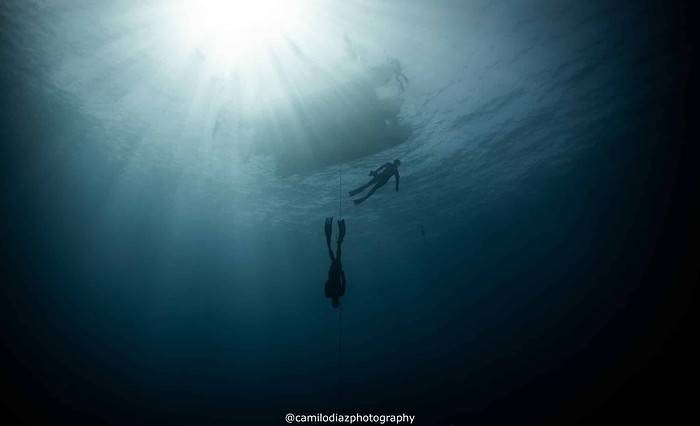
DeeperBlue.com: What is your biggest motivation?
Alex Llinas: I want to inspire people to realize that despite age, illness, and personal circumstances, you can always persevere if you work hard at achieving your goals. I want people to believe in themselves and pursue their dreams and understand that it is never too late. I am 44 years old and am just now starting my journey into competitive freediving, so there’s no excuse! But, most of all, I want to make my dad proud, for he was an inspiration to many.
DB: What was your childhood like?
AL: In many ways, my childhood was amazing, even if somewhat untraditional. My mother left when I was so young that I didn’t know what it was like to have a mom. It was just me and my dad who stepped up to the role of being both parents with a lot of energy. He was an athlete and waterman – really before that term even existed – and just loved the outdoors and adventure. My mother ended up getting caught with drugs in a really bad way. She lived on the streets for the majority of my life. My dad and my mom’s side of the family tried many different approaches to help her escape the world of drugs, but they never succeeded.
As far as my childhood, weekends were mostly centered around camping trips or the beach while my dad would windsurf. This was a more innocent time in the world; I was given a lot of free reins to go in the water and wander around without supervision. Since I can remember, I was always in the water. So my dad trusted my ability to take care of myself and not get in too much trouble….this wasn’t always the case, but it was mostly innocent naughty kid stuff.
When we moved to San Andres Island, it was such a small place (only 20km in circumference) that I was allowed with my friends to go anywhere on the island on my own as long as he knew where I was. We would all meet at the windsurfing spots after school and on the weekends or go in the water and explore. I would ride my bike, ask people for rides, take public transportation to meet with my friends, or go to different places on the island for adventures. San Andres was my favorite place in my childhood. I still have friends there that I keep in contact with. Aside from this, my dad managed to move quite a bit, so I basically spent my 16 years in Colombia, splitting equal time between Medellin, Barranquilla, and San Andres, but it wasn’t always continuous. By the time I graduated from Highschool in the USA, I had attended 11 schools. Some were because we moved so much, some were because they were private schools and I was naughty, and they would not let me back the next year. Oops.
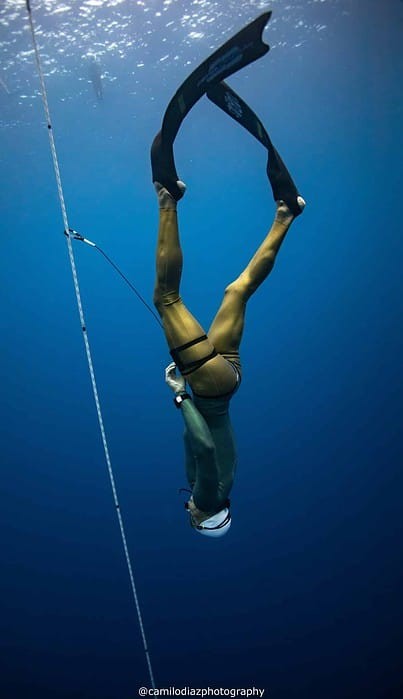
DB: So you’ve always had a free spirit- seems somewhat common from freedivers. Where did you find your aquatic abilities?
AL: 100%, my dad. Since childhood, the ocean has been a big part of my life. My dad was a competitive swimmer and triathlete and taught me to swim, dive, and windsurf at a very young age. It is because of this lifestyle that I felt so comfortable in the water and was able to pick up sports rather quickly. Also, I started many new hobbies and sports from all the moving around. This helped me become a well-rounded athlete as well as helped me grow in the water.
DB: How did you become a freediving athlete? And do you have any role models?
AL: My father has been a huge influence on me. He set me up to be the person I am today. His selflessness, passion, dedication, and tenacity are all things I want to achieve.
I first set on the path to becoming an athlete in 2013 when I first provided safety at Vertical Blue, and I had the opportunity to meet all these athletes that somehow had figured out how to take significant amounts of time off to train and compete. At that moment, I was in the midst of my Engineering career, and I just could not understand how that was possible. I talked to some of them- in particular, I had a chat with Jonathan Sunnex that motivated me to find a way to make it work so I could pursue my passions…so all the people that I get to meet that are finding creative ways to make their dreams come true are role models to me, anyone that figured out how to avoid the traps of corporate life and society expectations is a role model.
Now, for your more standard response, as far as athletes that have inspired me outside of the realm of freediving, I was a big Kobe Bryant fan, I loved his near-psycho work ethic and I can do anything attitude. Robby Naish (American athlete and entrepreneur who has won 24 World Championship Windsurfing titles) is a huge inspiration, he is almost 60 years old, and if you see him ride anything in the water, you will be blown away! He has been a huge part of the progression of wind sports/surf/SUP, and even at this age, he still rips!
DB: What do you consider to be your biggest setback in freediving?
AL: There have been many, but the most significant was the year I lost my father. This was a devastating year for me…. Before this, in 2019, I was preparing to take a portion of the next year off to both compete and work as a chief of safety in various freediving competitions…but then the Pandemic started. Shortly after, on April 23, 2020, my father, Alejandro Llinas, a well-known Colombian social leader, was murdered for fighting against corruption and injustice and trying to protect the environment. It’s hard to quantify what his loss in my life meant to me. All of my dives are dedicated to him.
The other big setback was the cancer diagnosis; I could not go in the water for six months and had a compromised immune system for almost two years. It led to some bad complications and health issues for a significant time. In the Roatan 2019 World Championships, while I was working as a safety, I had to be Air Lifted to the US because of an infection that almost took my life due to my compromised immune system. I spent two weeks in a hospital under Neutropenic precautions and hoping that the doctors could treat the infection before I went septic.
I have had to use all these setbacks as motivation to come back strong and keep going, I have no idea how long I will be in this world, and I want to make sure that when I look back, I can say I did the most that I could with what I was given.
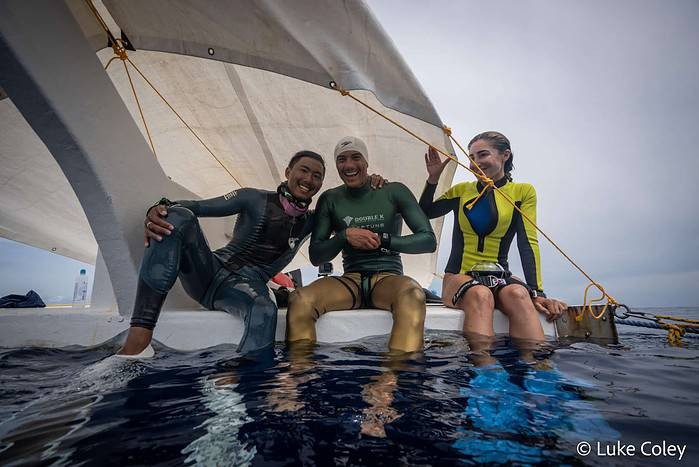
DB: What was it like to return to the water after chemo?
AL: Returning to freediving was all I could think about during my time in Chemo. I could not wait to get back in the water. I kept asking my doctor if he would let me and what the consequences would be, and try to find a way around it, but the answer was always the same. No freediving. It wasn’t until March 2020 that I was able to get back in the water. It was an incredible moment for me.
We were in Puerto Rico with my friends, surfing, diving, windsurfing, and just having the best time! I made a big effort to stay in shape whenever I could during chemo to immediately resume my previous lifestyle when it was over. In my life, I have had to deal with a good bit of adversity; mostly, it has been circumstances beyond my control, and the only way I have tried to manage it is to be strong and overcome.
For me, chemo was just another challenge, one of the most significant in my life, but there was no way I would let cancer stop me.
Yes, there were a lot of side effects from chemo, and, honestly, I wasn’t the same person for over a year. But little by little, my immune system improved, and all the other issues I had started going away. I am happy to say that I am in remission and feeling healthy, but that’s the thing about remission, you never know when it will come back. So you just have to give your everyday all.
DB: What do you consider to be your greatest freediving moment?
AL: The AIDA world championships were my greatest freediving moment, and it exceeded my expectations by far. Every dive was a PB, some by as much as 5m, and every dive was a white card. I got to do my 1st 100m dive and then follow it up with a 101m bi-fin dive in CWT. With the Continental records, national records, and medals, it was just the most incredible experience one could expect for their world championships.
DB: Who are your freediving mentors?
AL: I was really fortunate to take my 1st course with Martin Stepanek at FII, and that decision alone had the biggest impact on my freediving career. It was there that I realized how much I wanted this to be a part of my life. In general, I have been extremely lucky to have met the best freedivers and teachers in the world and to be good friends with some of them; they have always helped me out and encouraged me, and given me advice…to name a few Vitomir, Julia Mouce, Jonathan Sunnex, Alessia, Thibault, Alenka, Sayuri, William Trubridge, Daniel Arias, Carlos Correa, Alexey, John Aristizabal and countless more. They are an inspiration not only because of their accomplishments but also their dedication to growing this sport and their willingness to help others reach their goals.
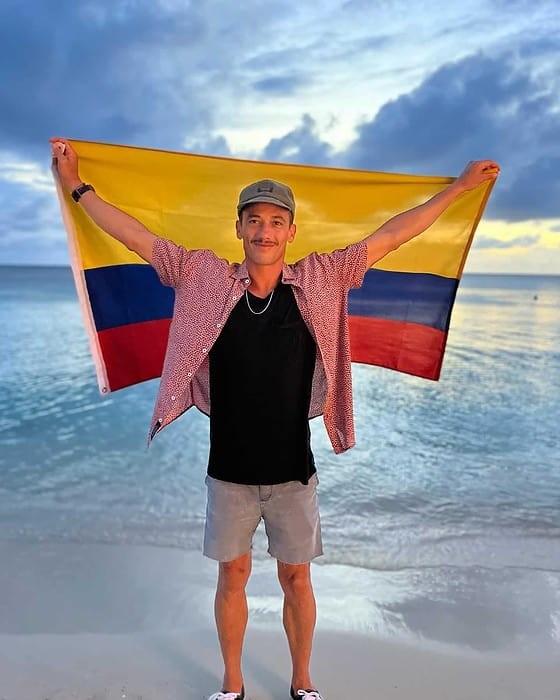
DB: Why no fins? Just why?
AL: I was told that breaststrokers aren’t made; they are born. I guess my goofy arms and legs make for a good breaststroker. No fins actually feel like the most natural stroke for me, it feels effortless, and I love the connection with the water. I love the timing and technique involved, I love the feeling of gliding, and to be honest, I thought this would be the one discipline that I would have an advantage over other competitors. CNF requires a lot of technique for the swimming portion, but for me, it was just a modified breaststroke: pull out, repeat until freefall, and then the same stroke on the way up… Also, my EQ needs work, so this is the shallowest discipline.
DB: What’s it like to work on film and production sets?
AL: For me, it has been an incredible experience. It can be a lot of hurrying up and waiting, but when we are working, it’s really fun. I met, trained, and worked with some really impressive names in the industry. And I got paid to hold my breath and swim around!
On a more serious note, it was a big learning experience. The movie industry is quite a complex organization with its tribes, lingo, and organization. It can be overwhelming. Luckily for me, the people I worked with on this last project were very nice and helpful, and the work atmosphere for the underwater unit was positive.
DB: What training advice do you have for others?
AL: Approach freediving like an athlete; have a coach that can guide your training and schedule and give you feedback on your progress. Spend a lot of time in the pool and the gym. Perfect your swimming technique in the pool. If you can improve your swimming, you can spend less energy/oxygen getting to and coming back from depth. Enjoy the process. Have fun, do other activities, and maintain a healthy lifestyle
DB: What about dry training? Are you into it?
AL: If you mean dry statics and O2/CO2 tables, then heck no!! you would have to motivate me to sit still on a couch and suffer; I prefer the wet kind of training! That being said, I understand the importance of dry exercises, especially EQ and stretching, and I spend time on both as they are two very important aspects I need to improve. I do, however, enjoy gym training and other dry sports that can help with conditioning, like running and cycling.
DB: What training techniques have helped you excel?
AL: I think my swimming background has had the biggest impact on my freediving. It made for an easier transition into depth and made pool training more enjoyable. But I believe that every sport I have competed in has contributed to my ability to progress in different ways. Having worked with coaches in other sports, I understand the importance of having a good schedule/program and feedback. For me, it’s easier to do what I am told than to worry about whether a particular training is a right choice for the day, so I leave the training techniques to the coach.
DB: What are your next steps in freediving? Where do you see yourself?
AL: After competing in AIDA World Championships, many of the goals I had set for this year were surpassed. I did not expect to get to 100m this season and take three continental records. My goal for the remainder of the year is to continue training, adding depth to all disciplines, and performing to the best ability in CMAS World Championships. I will likely focus on CNF and CWT, and the goal would be to get the records in both of those disciplines. A podium or a top 5 in either discipline would be a good way to end the season. After the world championships, I will go on a surf trip, decompress and sort of forget about freediving for a few days. Then it’s back to planning, training, and preparing for the next season. Hopefully, I can find the support to continue doing this as a full-time freediver, and next year should look similar to 2022.
DB: Are you mad that James Cameron didn’t invite you to be in the second Avatar movie?
AL: So I know it’s a joke, but funny you should mention it because that’s a funny story all on its own! The underwater Director of Photography for Avatar is my good friend and legend Peter Zuccarinie, almost got me this job…actually, he has gotten me quite a few jobs! Thanks, Pete!… I auditioned and sent all kinds of videos swimming like I was an underwater creature with a tail, etc. In the end, I believe because of being out of town and not having a closer relationship with the stunt coordinator, that they chose other people. But this story does have a good ending, as my friend Pete ended up being the underwater DP for a Marvel film and got me a really good stunt job that lasted almost eight months. And I got the chance to work with some of the same people in Avatar anyway!
To connect with Alex, check out his Instagram profile, @saltyfreediver.

